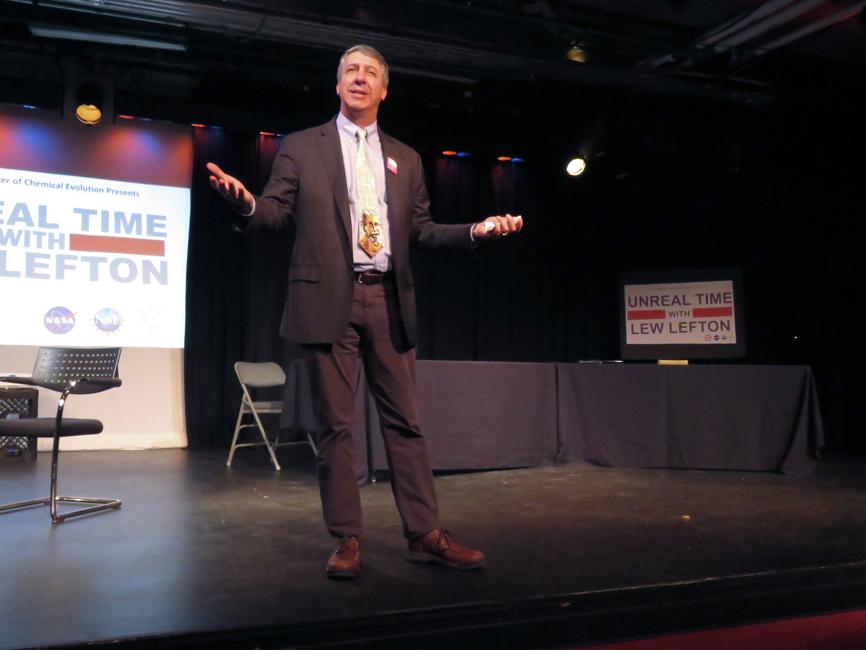- You are here:
- Home
September 16, 2019
| Atlanta, GA
Editor's Note: This story by Maureen Downey in the Atlantic Journal Constitution was originally published on Aug. 15, 2019. It is reposted here with permission.
As a child in New Mexico, Lew Lefton, Georgia Tech associate vice president for research computing, had two passions, math and comedy. Until sixth grade, he never understood mathematics could be a career, figuring mathematicians were akin to blacksmiths, useful in the past, but not relevant today.
His decision to pursue advanced studies in math led to a breakup of sorts where he says he put comedy in the friend zone. “I liked comedy, but I would never consider her for a career,” said Lefton.
Then, in 1988, a postdoc mentor at the University of California, Riverside, asked Lefton to entertain an audience of academics with math jokes. He said he had them laughing their elbow patches off. The romance rekindled and Lefton decided he could manage both. “I had a niche sewn up — mathematician and comedian. He is funny, and he can prove it,” he said.
In New Orleans, where both he and his mathematician wife Enid Steinbart taught at the University of New Orleans, Lefton found himself writing more jokes than equations. Lefton’s comedy and improv career took off, and he worked regularly with other local comics who would go on to successful careers in show business, including physician Ken Jeong.
But the demands of nightly appearances and weekends didn’t mesh with a college teaching career, three children and a busy spouse. Georgia Tech offered positions to both Lefton and Steinbart in 1999.
At Tech, Lefton has found ways to integrate his interests. In addition to leading research computing, he teaches a computational approach to humor and helps other professors weave humor into their instruction through such Atlanta performance events as Science Riot and Geekapalooza.
While Lefton’s research publications include “Resonance and quasilinear parabolic partial differential equations,” he also co-authored papers on “Humor applied to STEM education” and “Improvisation methods to catalyze engineering creativity.”
He co-leads Tech’s Humor Genome Project, which he describes as Big Data for Humor. Housed in Tech’s Vertically Integrated Projects, where the emphasis is research and development, students investigate various techniques of data analytics and learn about cognitive theories of humor.
“Humor is a challenge for artificial intelligence,” said Lefton. “Is there something humans can do that computers can’t do? Humor appears to be one example.”
Lefton expects his students to learn how to gather and harness data, but there’s the added benefit students get through looking at funny stuff. “Humor helps people who are feeling depressed, not just watching humor but creating jokes,” he said. “Laughing creates social bonds that can help in stressful times. And college is a stressful time for lot of students.”
Lefton’s co-teacher in the project is fellow Tech faculty member Pete Ludovice, an MIT-educated chemical engineer who also performs comedy. Ludovice’s material often targets engineers. He jokes that Tech undergrad engineering majors “use the engineer’s preferred method of birth control — our personalities.”
Scientists doing stand-up is not as rare as it may seem. At the Atlanta Science Festival in March, Lefton and Ludovice served as emcees as nine academics made their comedy debuts. (Material was pegged as suitable for mathematically mature audiences.)
Georgia Tech microbiology professor Brian Hammer discussed fecal microbial transfers, or poop transplants. Hammer began with a lively account of the importance of gut germs, explaining their critical role in protecting the body from “the riffraff, the pathogens, the bad guys.” This was probably one of the few times an audience cheered for diarrhea. Emory biochemistry doctoral student Julia de Amorim talked about being a vegan, “saving the planet one canned chickpea salad at a time, with every almond milk latte, hold the whip.”
Lefton’s wryness is not unnoticed at Tech, where he has been dispatched to deliver the bad news about lottery odds to TV and radio audiences. When the lottery pot surpassed a billion dollars, Lefton informed Atlantans about the unlikelihood of hitting all six numbers. “You are not going to win the lottery. It’s not your fault. It’s the numbers...But you should play anyway because $2 is a great price for a dream.”
He’s also known at Tech for his April Fools’ pranks, including last year’s announcement that Georgia Tech would be the first major research university to have an AI graduate with an accredited degree. “In fact, TutorBot 3.1 will be awarded 44 of the 45 available Bachelor of Science degrees this May,” stated the release. In 2016, Lefton spoofed a poster of the new Georgia Tech Green with one for a “new math building,” which promised “an infinite number of power outlets, each one is only half as large as the previous one, a cafe with a coffee IV and 3.14 flavors of pie, and a mathematical makerspace with 2D plotters, 3D printers, and 4D time machines.”
Lefton’s 2013 April Fools’ missive revealed a new survey on the Tech mascot showing the campus about split on keeping Buzz or replacing it with an “actual yellow jacket, genetically engineered to be 5′ 4″ tall.”
For More Information Contact
A. Maureen Rouhi, Ph.D.
Director of Communications
College of Sciences

